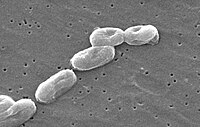
Photo from wikipedia
Burkholderia cenocepacia is an important human opportunistic pathogen that can cause life-threatening infections in susceptible individuals. It employs quorum-sensing (QS) systems to regulate biological functions and virulence. ABSTRACT Burkholderia cenocepacia… Click to show full abstract
Burkholderia cenocepacia is an important human opportunistic pathogen that can cause life-threatening infections in susceptible individuals. It employs quorum-sensing (QS) systems to regulate biological functions and virulence. ABSTRACT Burkholderia cenocepacia is a human opportunistic pathogen that mostly employs two types of quorum-sensing (QS) systems to regulate its various biological functions and pathogenicity: the cis-2-dodecenoic acid (BDSF) system and the N-acyl homoserine lactone (AHL) system. In this study, we reported that oridonin, which was screened from a collection of natural products, disrupted important B. cenocepacia phenotypes, including motility, biofilm formation, protease production, and virulence. Genetic and biochemical analyses showed that oridonin inhibited the production of BDSF and AHL signals by decreasing the expression of their synthase-encoding genes. Furthermore, we revealed that oridonin directly binds to the regulator RqpR of the two-component system RqpSR that dominates the above-mentioned QS systems to inhibit the expression of the BDSF and AHL signal synthase-encoding genes. Oridonin also binds to the transcriptional regulator CepR of the cep AHL system to inhibit its binding to the promoter of bclACB. These findings suggest that oridonin could potentially be developed as a new QS inhibitor against pathogenic B. cenocepacia. IMPORTANCE Burkholderia cenocepacia is an important human opportunistic pathogen that can cause life-threatening infections in susceptible individuals. It employs quorum-sensing (QS) systems to regulate biological functions and virulence. In this study, we have identified a lead compound, oridonin, that is capable of interfering with B. cenocepacia QS signaling and physiology. We demonstrate that oridonin suppressed cis-2-dodecenoic acid (BDSF) and N-acyl homoserine lactone (AHL) signal production and attenuated virulence in B. cenocepacia. Oridonin also impaired QS-regulated phenotypes in various Burkholderia species. These results suggest that oridonin could interfere with QS signaling in many Burkholderia species and might be developed as a new antibacterial agent.
Journal Title: Microbiology Spectrum
Year Published: 2022
Link to full text (if available)
Share on Social Media: Sign Up to like & get
recommendations!